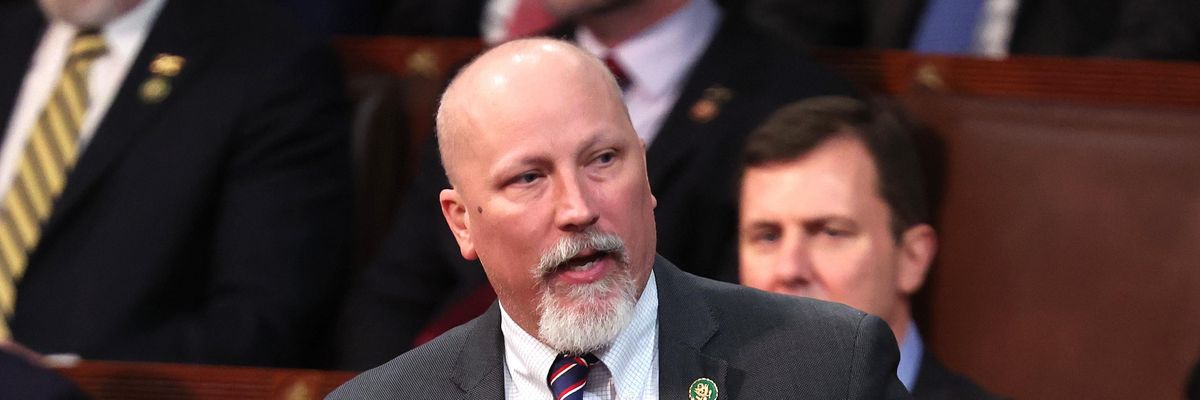Republicans who have pledged to use their narrow majority in the House to pursue steep federal spending cuts have sent a clear message in recent days: The bloated Pentagon budget is safe, but Social Security, Medicare, and other key government programs are not.
Rep. Michael Waltz (R-Fla.) expressed that sentiment during a Monday interview on Fox Business, saying, "I'm all for a balanced budget, but we're not going to do it on the backs of our troops and our military."
"If we really want to talk about the debt and spending, it's the entitlement programs," said Waltz, referring to Medicare and Social Security, among other programs. (By law, Social Security cannot add to the federal deficit.)
The office of Rep. Chip Roy (R-Texas)—one of the far-right Republicans that initially opposed Rep. Kevin McCarthy's (R-Calif.) bid for House speaker—was particularly adamant in a Twitter post on Sunday, declaring that "cuts to defense were NEVER DISCUSSED" in talks with McCarthy.
"In fact, there was broad agreement spending cuts should focus on NON-DEFENSE discretionary spending," Roy's office wrote, singling out a broad category that includes federal budgets for healthcare, education, environmental programs, and more.
The Texas Republican's staff was attempting to dispel reports last week that McCarthy opponents were seeking to cap federal spending across the board at Fiscal Year 2022 levels, a demand that—if fulfilled—would lop tens of billions of dollars off the historically high Pentagon budget in addition to slashing non-military domestic programs.
The reports of potential Pentagon cuts on the horizon contributed to a recent decline in the stock prices of major military contractors such as Lockheed Martin and Northrop Grumman.
Politico reported Monday that McCarthy did ultimately agree to hold a "vote on a budget framework that caps discretionary spending at fiscal 2022 levels and aims to balance the federal budget in a decade," but Republicans have insisted this week that any proposal to cut the U.S. military budget—something progressives in the House support—would likely go nowhere, even though the Pentagon is rife with waste and abuse.
"Most of us won't vote for cuts to defense," Rep. Don Bacon (R-Neb.), a member of the House Armed Services Committee, told Politico.
Rep. Rosa DeLauro (D-Conn.), the top Democrat on the House Appropriations Committee, said in a statement last week that the non-military spending cuts floated by House Republicans "would harm communities and families across the United States who are already struggling with inflation and the rising cost of living."
"From cuts to public health investments to decreases in funding for education," DeLauro added, "this secret deal endangers so much of the progress we made to help children and families, create better-paying jobs, strengthen our national security, and protect our environment."
"The same Republicans who plunged the House of Representatives into chaos last week are prepared to plunge America into an economic crisis... unless Democrats agree to their demands to cut Social Security and Medicare."
The omnibus spending package that Congress approved last month over the objections of Roy and other far-right Republicans includes $858 billion in military funding, making up more than half of the $1.7 trillion measure. Adjusted for inflation, the $772.5 billion allocated to non-military discretionary programs in the package represents a cut compared to the previous fiscal year.
In recent months, House Republicans–including Texas Rep. Jodey Arrington, who was just chosen to head the chamber's budget committee—have said they want to target both discretionary government outlays and mandatory spending that includes Social Security and Medicare, potentially using the debt ceiling as leverage to secure changes to the popular programs.
Bloomberg Government reported in October that Arrington said an "increase in the eligibility age for both programs would be a commonsense change," a sentiment echoed by several other House Republicans.
"There it is in black and white"
A slide shown during a House Republican conference meeting on Tuesday indicates that the party is committed to exploiting a debt ceiling showdown to push for spending cuts—even though such cuts would likely be a non-starter for the Senate and White House.
The seventh point on the slide, titled "Budget and Spending," states that the House GOP "will not agree to Debt Limit increase without budget agreement or commensurate fiscal reforms."
The slide also signals that the House GOP will push for "reforms" to mandatory spending programs and "reject any negotiations with the Senate" on spending unless their proposals "reduce non-defense discretionary."
"There it is in black and white," Rep. Brendan Boyle (D-Pa.) tweeted in response to the presentation.
In October, Boyle led a group of House Democrats in imploring party leaders to raise the debt ceiling during the lame-duck session to avoid a potentially damaging 2023 showdown with Republicans. The Democratic leadership did not heed Boyle's call.
"House Republicans are openly plotting to hold the full faith and credit of the United States hostage—threatening to blow up our entire economy—because they want to force cuts to Social Security and Medicare," Boyle wrote Tuesday.
The progressive advocacy group Social Security Works similarly warned that "the same Republicans who plunged the House of Representatives into chaos last week are prepared to plunge America into an economic crisis... unless Democrats agree to their demands to cut Social Security and Medicare."




